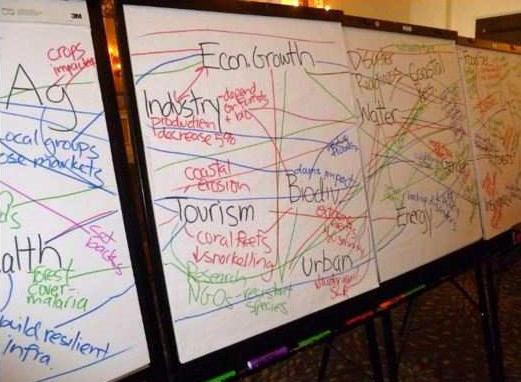Providing Training to USAID Staff on Global Climate Change
Connect with an expert opens in a new pageChallenge
Climate change is already having impacts on human health, infrastructure, ecosystems and security worldwide, serving as a threat or risk “magnifier” that compounds existing challenges in multiple sectors. While there is strong scientific consensus on anthropogenic climate change, there is still a high degree of uncertainty in certain aspects of projected climate changes and resulting impacts. This uncertainty has its roots in both an incomplete understanding of natural systems and also in unknowns as to how the world will respond to this challenge through policies and actions. Nonetheless, governments, companies and individuals continue to make decisions ranging from short-term, operational decisions to long-term planning decisions in light of uncertain information, as they continue to experience an increasingly variable climate.
In the international development context, impoverished populations in developing countries are often the most vulnerable to climate stressors, with limited capacity to adapt. Climate change can undercut the investments already made in international development by the U.S. and international community. The agricultural livelihoods of many populations in developing countries are particularly climate-sensitive. In many cases, such populations do not have the resources to deal with even historic levels of climate variability. In addition, settlements in marginal lands, whether urban areas or along coasts, add to the climate change vulnerability of populations.
The U.S. Agency for International Development (USAID) has recognized the importance of addressing climate change as part of their work, and identified a strong need to integrate climate change considerations into existing programs and projects. USAID’s staff have a mix of technical and non-technical backgrounds, and a large range of responsibilities competing for their time. Thus, USAID needed a concise, unbiased presentation of key information related to the latest climate change science as it underpins vulnerability and adaptation analysis in the international development context. USAID also needed to give its staff hands-on experience with current tools to analyze vulnerability and boost resilience.
The Solution
As a key member of a team supporting USAID, Battelle staff helped pioneer the development and delivery of a climate change training course to USAID staff worldwide. Battelle led the development of two modular training courses: Integrating Climate Change into Development, and Climate Change Adaptation Specialized Module. Each 2-day course was designed to help government decision makers utilize climate information, tools and resources to achieve their job objectives in a climate‐resilient manner. The development of these courses drew on the background of Battelle staff in both climate change science and a range of disciplines including climatology, natural ecosystems, social and economic systems and infrastructure. Battelle’s status as a 501(C)(3) charitable trust and private independent research organization was well matched for the sensitive and complex issue of climate change.
Battelle helped design the modular training courses to be highly interactive, with a hands-on approach, tied carefully to learning objectives for each session. Battelle staff provided particular expertise on the benefits and limitations of downscaled climate models, uncertainty in climate projections, sectoral impact assessment and the evaluation of technical climate change adaptation options. The formats of the sessions included information sharing and discussion, guided computer lab activities, interactive quizzes and role-playing exercises. Battelle staff also coordinated with USAID field staff to develop realistic case studies in sectors such as water resources, health, disasters, ecosystems, agriculture, tourism, energy and urban systems, each with a regional focus in Latin America, Africa or Asia. The sessions were designed with adequate opportunity for discussion in order to leverage not only the expertise of the training staff but also the experience of the trainees
The Outcome
Battelle staff provided trainings to regional workshops in Ethiopia, Thailand and the U.S., for over 150 USAID staff total, as part of a targeted training team. The training materials developed included detailed trainer’s guides, trainee handouts and presentation copies, exercises with answer keys, and reference lists for additional information. Battelle also supported the development of an online pre-test, titled Climate Change 101, that used a web format to appropriately place trainees in the proper training module. Building on this initial training material, USAID has continued to integrate climate change training into their staff development to boost the resilience of their development projects worldwide. This project provides an example of Battelle’s ability to translate scientific information with high uncertainty for technical and non-technical audiences alike in order to inform robust planning processes.

A Hands-on exercise led by Battelle staff at the USAID Global Climate Change Training
Case Studies
Technology Commercialization and Licensing
With over 90 years of research and development experience, Battelle supports all areas of industry with intellectual property licensing focused on bringing our cross-disciplinary expertise to meet our clients' most difficult challenges.
